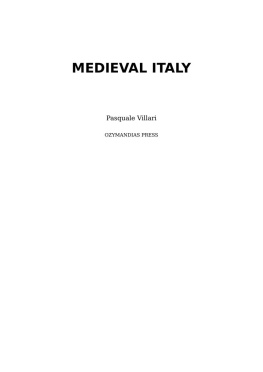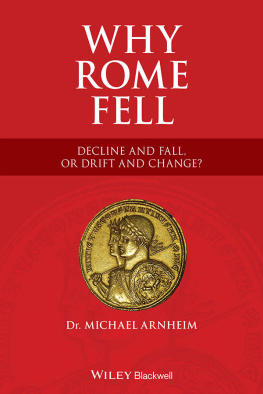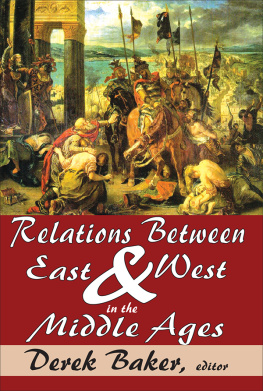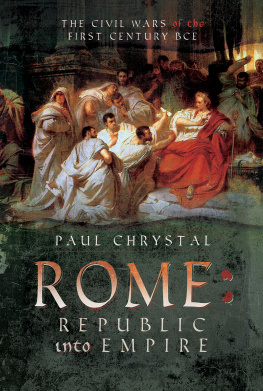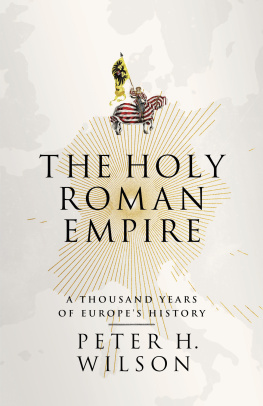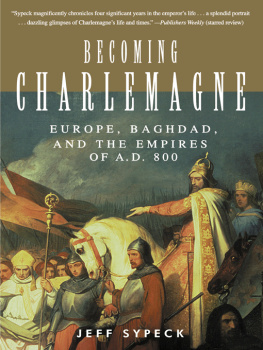THE PLACING BY LEO III. of the Imperial crown upon the head of Charlemagne in St. Peters on Christmas Day of the year 800 marked the commencement of a new era in the history of the world. But the Empire of the West, initiated at that moment in its dual characterpolitical and religiouscontained within itself the germs of infinite discords and calamities. As Roman and Christian it should have symbolised the union of nations; but meanwhile the Empire of the East, heir to Rome, continued to exist at Constantinople. Furthermore, the Western Empire was composed of very dissimilar races which, until then divided and subdivided among themselves, had often been at war with one another. The greatest and most immediate danger to the unity of the Empire came from the German principle of succession, according to which the State, as the property of the Sovereign, must be divided among his heirs. This principle, which in the past had caused many bloody wars among the Franks, promised no good for the future of the new Empire. Charlemagne, who was a very great leader of Teutonic peoples, but who lacked the true genius of organisation, held it together by the power of his sword and the strength of his personal authority. It was therefore easy to predict that his death would be followed by a period of anarchy.
The tendency to division and subdivision soon showed itself clearly in all regions, but especially in Italy. There the vast Duchy of Benevento, unconquered by the Franks, had remained in possession of the Longobards, preserving its independence. The rest of Southern Italy, together with Sicily, continued in its allegiance to the Byzantine Empire. In Central Italy the Pope was supreme. In the rest of the peninsula, as in all other parts of the Empire, duchies had been cut up into counties. The Counts were appointed by the Sovereign and depended on him; and even the Bishops, especially outside Italy, were chosen by him. The Counts and Bishops should have worked together, but the limits of their respective authority not being well defined, great confusion was inevitably produced by the politico-ecclesiastical character of the new Empire, and led at once to a series of fresh calamities.
For purposes of defence, groups of counties situated on the frontiers of the Empire were welded together into large duchies and were called Marches. Thus it came about that in Italy the Friulian Marches, eventually extending to the Adige, were constituted. The great Duchy of Spoleto, on the southern border of the Empire, was preserved intact. Later on, the Counts of Turin, of Asti, and of Ivrea enlarged their dominions by incorporating various other counties. Finally, the great Marquisate of Tuscany was formed, and its Marquises were so many small but powerful potentates. But for the moment no further mention of them is required.
The unity of the Empire was represented by Charlemagne, and in his palace he was surrounded by a vast number of domestics and officials who formed his court. The Missi Dominici supervised the whole administration, and there were two for each Missatica or province, usually one a layman and the other an ecclesiastic. According to Teutonic custom, the people took part in the administration of justice and of public affairs. Assemblies, therefore, formed an important part of the political constitution of the Empire. They were also held in the duchies and counties, but these were local assemblies of the same nature as the meetings called together by the Missi before they commenced their inspections. The General Assemblies were of a different character, and the kingdom of Italy, which, although forming part of the Empire, preserved its autonomy, had its own. There were two of these assemblies, and, save in exceptional circumstances, they were convened the one in spring and the other in autumn. The first and more general was called by the Longobards Campo di Marzo, or Field of March; and by the Franks Campo di Maggio, or Field of May, from the month in which it met. Charlemagne held it even later in the year. The Nobles and the people took part in it, and its decrees became law for the whole Empire. At the autumn assembly the Nobles sat alone, and they drafted the laws and decrees which were to be approved by the larger assembly. The participation of the people in the spring council was reduced by degrees to a mere form.
The Teutonic laws had a personal character and differed with each race. They were merely customs sanctioned by use and spontaneously born of the popular conscience, and had therefore to be approved by the people after being formulated by the elders. The General Assembly had to decide whether that which was written down were a faithful reproduction of the national custom. The Sovereign had no more power to abolish or change such laws than he had to abolish or change the language of a people. Charlemagne fought, conquered, and subjugated the Saxons; but when he wished to legislate for them he had first to consult them. There existed, however, also certain general laws which applied to the whole Empire, and these, emanating directly from the Emperor, were called Capitularia, because they were divided into chapters. In latter times the Cafiitularies were used to modify local laws, and were then called Capitularia legibus addenda. But originally the Sovereigns power of legislation was extremely limited.
Everything in the new Empire seemed designed not only to separate the various nationalities of which it was composed, but to destroy society itself and all unity of government. Rural property assumed always more the form of a beneficium, bringing with it the obligation to the holder of paying tribute in money or in kind, and of rendering service to the person from whom the beneficium had been received and under whose protection he remained. This state of dependence was further augmented by the Commendatio, which took various forms and was another kind of vassalage. In Charlemagnes time there still existed vassals without beneficia, but there were no beneficiaries who were exempt from vassalage. This beneficiary form of property holding became more and more general. Not only land but offices were given in this manner. Charlemagnes officials, the great Nobles, the Counts, and the Bishops, even the members of the Imperial family who held rule, were all beneficiaries. As time went on the beneficia became hereditary, and thus acquired greater importance and independence.
The institutions of beneficium and commendatio, together with immunity, constituted feudalism. The immunity originally appertaining to lands possessed by the Sovereign, by the Bishops, and by the monasteries continued to have force even when such lands were conferred as beneficia. In this way on the one hand the guarantees of personal liberty were diminished, while on the other the sovereign power was weakened by division and subdivision. Society, by taking on the forms of feudalism, appeared to be breaking up into fragments. The relations between the Sovereign and his people, carried on by means of offices and beneficia, gave to the feudal nobility a character which, little by little, formed itself definitely in their families by right of succession, and which continually infringed on the Sovereigns power.

